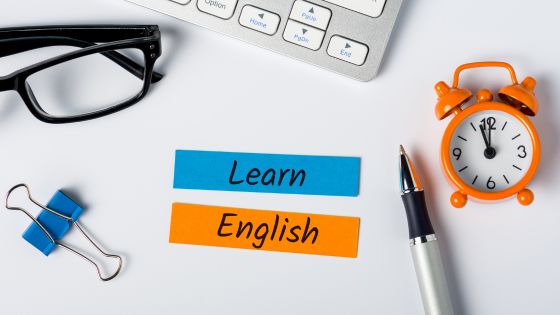Particularly when it comes to mastering English, learning a new language may be a tough but rewarding process. One of the most extensively spoken languages in the world, English is crucial for cross-cultural interaction and professional development. Here are eight efficient ways to aid you in your language learning if you’re keen to get over language hurdles and improve your English.


Top 8 Effective Strategies To Learn English
Here are eight top strategies to help you learn English efficiently and confidently. So just read the all information sincerely.
1. Immerse Yourself in English:
Immerse yourself as much as you can in the language to hasten the learning of English. Spend time in English-speaking situations, such as by reading English books, watching English television shows, and listening to English music. You will acquire more accustomed to the vocabulary and rhythms of the language as a result of this exposure.
2. Set Realistic Goals:
Setting definite, attainable goals is essential for success in any learning project, including language learning. Establish clear objectives for your English learning, such as being fluent in speaking English or memorizing a certain vocabulary. To track your progress and maintain motivation, break your goals down into more doable, shorter activities.
3. Practice Speaking Regularly:
For English speakers to become fluent and confident, speaking practice is crucial. Find English-speaking individuals to communicate with or look for language partners. If you don’t have access to native speakers, think about joining online forums or communities where you may communicate with English learners from all over the world. You may enhance your pronunciation, vocabulary, and communication abilities by speaking frequently.
4. Utilize Technology:
Utilize the different technology tools at your disposal to improve your English learning process. Apps for learning languages, like Duolingo and Babbel, can offer organized lessons, vocabulary drills, and interactive tests. A multitude of English language resources, including tutorials, language classes, and real conversations, are also available on websites like YouTube and podcasts.
Even you can use online tool that helps you to learn English effectively.
5. Expand Your Vocabulary:
For any language, having a large vocabulary is essential for good communication. Establish a daily routine of learning new words and phrases to increase your vocabulary in English. To practice and solidify your comprehension, consult online dictionaries, vocabulary applications, or flashcards. Reading articles online, in books, or in newspapers can also be beneficial for learning vocabulary in context.
6. Engage in Active Listening:
A crucial skill for learning a language is active listening. Utilise English audio resources to actively engage in improving your listening comprehension. Watch English-language TV shows and films, or listen to podcasts and news broadcasts. Put your attention on comprehending the spoken language’s meaning, tone, and pronunciation. Transcribing and repeating a dialogue will help you improve your listening abilities.
7. Join English Language Classes or Courses:
Formal instruction in the form of classes or courses can offer a well-organized learning environment with qualified direction. Enrol in English language programs at a nearby university or think about online programs created just for English learners. These lessons can provide beneficial chances to practice speaking, get criticism, and systematically pick up grammar and vocabulary.
8. Embrace Language Exchange:
Through language exchange programs, you can converse with English-speaking natives who are studying your mother tongue. You can converse, practice speaking, and get useful language-related feedback through these interactions. Online resources, language institutes, or regional community organizations can help people find language exchange partners.
How Can I Improve My English Speaking Skills?
Find native English speakers to converse with, look for language exchange partners, or join online discussion groups to hone your English communication abilities. Regular speaking practice will help you become more fluent and confident.
What Are Some Recommended Language Learning Apps?
You may use programs like Duolingo, Babbel, and Memrise to help you learn English, among other languages. These applications provide interactive activities, vocabulary tests, and progress monitoring.
If you are a native language speaker then you can also use the Englishtosinhala tool which makes the translation easy for you.
How Can I Improve My Listening Comprehension In English?
Watch English-language TV shows, films, and videos to hone your active listening skills. Listen to interviews, newscasts, and podcasts. Concentrate on understanding, take note of new words, and imitate pronunciation.
How Can I Immerse Myself In English Culture?
Watch English-language films and television programs, read English-language literature, learn about English traditions and customs, and interact with English-speaking people to become fully immersed in English culture.
What Should Be My Approach To Learning English?
Set definite objectives for yourself while you learn the language, immerse yourself as much as you can in it, practice frequently, make use of tools and resources, and seize opportunities to practice speaking and listening.
How Long Does It Take To Become Fluent In English?
The length of time it takes to learn English fluently varies based on several variables, including prior language learning experience, dedication, and regular practice. It is a gradual process, and improvement depends on consistent practice.
Conclusion
It takes commitment, constant practice, and a range of efficient techniques to overcome language difficulties and become fluent in English. You can advance significantly in your English language learning by immersing yourself in the language, setting achievable objectives, practicing speaking, using technology, increasing your vocabulary, practicing active listening, enrolling in language programs, and embracing language exchange. To become fluent and to take advantage of the numerous prospects for both personal and professional progress, keep in mind that patience and perseverance are essential.


























